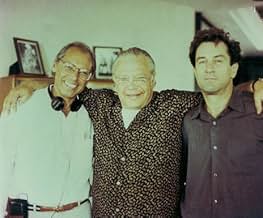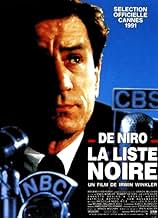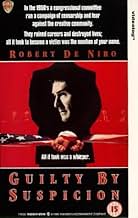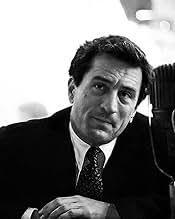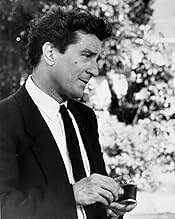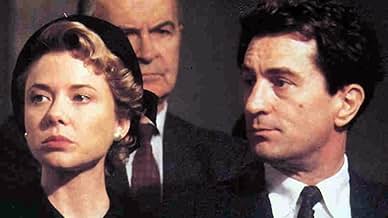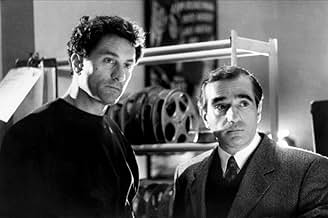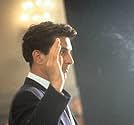Returning to Hollywood 1951 after working in France, a movie director meets McCarthyism head-on.Returning to Hollywood 1951 after working in France, a movie director meets McCarthyism head-on.Returning to Hollywood 1951 after working in France, a movie director meets McCarthyism head-on.
- Awards
- 2 wins & 2 nominations total
Roxann Dawson
- Felicia Barron
- (as Roxann Biggs)
- Director
- Writer
- All cast & crew
- Production, box office & more at IMDbPro
Featured reviews
In 1947 the House Committee on Un-American Activities began an investigation into Communism in Hollywood. Shortly after this director David Merrill returns from filming abroad. It is not long before he is targeted for having attended "a few meetings" a few years ago. The approach is softly, softly with the committee just wanting Merrill to name some more names for them. When he refuses to help, he finds himself gradually cut out of studios and projects, with fewer and fewer people willing to take his calls.
The period of history around which this film is set is an interesting one and one that is worth knowing about as part of the whole "learning from history" ideal. However this is not the same as the film itself being good because unfortunately it is not what I would have liked. It relies too heavily on the informative nature of the recreation of the period rather than developing an interesting script with realistic characters. It doesn't help that the film tries to be all very serious and respectful but does rather fail and ends up coming over all earnest and self important. The script also tries not to really upset anyone who didn't take the moral stance of the fictional Merrill by just focusing on him even though it would have been a lot more interesting if it had had outrage, bitterness and realism at its heart.
Winkler directs without a great deal of style and his courtroom scene is average where it should have been the best scene of the film. De Niro works his material hard and makes for an engaging lead, however it is the lack of depth and complexity in his material that limits his performance. This is more or less true of the rest of the cast which, although starry, doesn't really provide anyone in particular with an opportunity to mark themselves out. Bening, Wendt, Wettig, Wanamaker, Sizemore, Scorsese, Cooper and others are good presences but not much more than that.
Overall then an interesting film in so much as it informs about an important period of history. However it is all very earnest and safe and lost a lot of potential for me. The cast is starry but the material is middle-of-the-road and didn't give anyone the complexity and outrage that the subject deserved.
The period of history around which this film is set is an interesting one and one that is worth knowing about as part of the whole "learning from history" ideal. However this is not the same as the film itself being good because unfortunately it is not what I would have liked. It relies too heavily on the informative nature of the recreation of the period rather than developing an interesting script with realistic characters. It doesn't help that the film tries to be all very serious and respectful but does rather fail and ends up coming over all earnest and self important. The script also tries not to really upset anyone who didn't take the moral stance of the fictional Merrill by just focusing on him even though it would have been a lot more interesting if it had had outrage, bitterness and realism at its heart.
Winkler directs without a great deal of style and his courtroom scene is average where it should have been the best scene of the film. De Niro works his material hard and makes for an engaging lead, however it is the lack of depth and complexity in his material that limits his performance. This is more or less true of the rest of the cast which, although starry, doesn't really provide anyone in particular with an opportunity to mark themselves out. Bening, Wendt, Wettig, Wanamaker, Sizemore, Scorsese, Cooper and others are good presences but not much more than that.
Overall then an interesting film in so much as it informs about an important period of history. However it is all very earnest and safe and lost a lot of potential for me. The cast is starry but the material is middle-of-the-road and didn't give anyone the complexity and outrage that the subject deserved.
Some Americans today may never have heard of Senator Joseph McCarthy and McCarthyism. McCarthyism is the practice of making accusations of subversion or treason without proper regard for evidence. The term refers to U.S. senator Joseph McCarthy (R-Wisconsin) and has its origins in the period in the United States known as the Second Red Scare, lasting from the late 1940s through the 1950s. It was characterized by heightened political repression and a campaign spreading fear of communist influence on American institutions and of espionage by Soviet agents. After the mid-1950s, McCarthyism began to decline, mainly due to the gradual loss of public popularity and opposition from the U.S. Supreme Court led by Chief Justice Earl Warren. The Warren Court made a series of rulings that helped bring an end to McCarthyism.
The movie "Guilty by Suspicion" takes place in Hollywood during the height of the Second Red Scare. The movie focuses on David Merrill (Robert De Niro) though he is indicative of many Hollywood personnel affected by the Communist witch hunting.
David, by all indications, was a gainfully employed movie director that was in constant demand. He would have been able to stay gainfully employed so long as he told the F.B.I. what they wanted to hear. And they wanted to hear that certain friends of David's were Communists. David, valuing friendship over finances, opted to keep quiet about any of his friends activities. For that, David was put on the Hollywood blacklist.
"Guilty by Suspicion" is a weighty movie. We get an up close and personal look at what McCarthyism was doing to people's lives. Now I know that some of you may be saying, "Who cares? It was Hollywood." To that I would say that the Constitution never put zoning restrictions on who it applied to. The Constitution didn't have a Hollywood exemption in it and the U.S. government was trampling all over people's Constitutional rights. If they didn't have enemies within the U.S. they were certainly making them.
The movie "Guilty by Suspicion" takes place in Hollywood during the height of the Second Red Scare. The movie focuses on David Merrill (Robert De Niro) though he is indicative of many Hollywood personnel affected by the Communist witch hunting.
David, by all indications, was a gainfully employed movie director that was in constant demand. He would have been able to stay gainfully employed so long as he told the F.B.I. what they wanted to hear. And they wanted to hear that certain friends of David's were Communists. David, valuing friendship over finances, opted to keep quiet about any of his friends activities. For that, David was put on the Hollywood blacklist.
"Guilty by Suspicion" is a weighty movie. We get an up close and personal look at what McCarthyism was doing to people's lives. Now I know that some of you may be saying, "Who cares? It was Hollywood." To that I would say that the Constitution never put zoning restrictions on who it applied to. The Constitution didn't have a Hollywood exemption in it and the U.S. government was trampling all over people's Constitutional rights. If they didn't have enemies within the U.S. they were certainly making them.
Director David Merrill (Robert De Niro) returns from filming in France to find the country over-run by the Red Scare. People are all taking loyalty oaths. The House Committee on Un-American Activities is hunting for Communists. Bunny Baxter (George Wendt) is his writer best friend. Actress friend Dorothy Nolan (Patricia Wettig) is struggling after her husband named names. David's married to Ruth (Annette Bening) with a young son. Friendships and marriages are breaking apart as tension rises. With his work on the line, Merrill is also pushed to name names as others acquiesce.
It's a sincere telling of a fictional Red Scare story with some of the real players in the real history of the Un-American Activities Committee. It's very sincere but not the most thrilling drama. The actors are first rate. Despite the good work, there are no surprises and nothing too dramatic. It feels more or less melodramatic. This is one movie where a based on true story would be useful.
It's a sincere telling of a fictional Red Scare story with some of the real players in the real history of the Un-American Activities Committee. It's very sincere but not the most thrilling drama. The actors are first rate. Despite the good work, there are no surprises and nothing too dramatic. It feels more or less melodramatic. This is one movie where a based on true story would be useful.
I consider this period of the early 90's to be Robert DeNiro's second wind, if you will, after many great films he starred in the 70's. This film, along with the excellent Goodfellas, Awakenings, Night and the City, A Bronx Tale, and Cape Fear highlighted a great actor's resume. He hasn't done many great films in a while, but his acting chops speak for themselves. He stars here as David Merrill, a blacklisted director in Hollyweird, who's basically accused of being a communist and certain government factions want him to name names. His performance, although subdued, is very solid as he struggles with the decision to either report his friends, who are thought to be Communist in order to rescue his once promising career, or refuse to give up any names so their lives and careers won't be destroyed also. There's a moving scene between Merrill and congress as they bombard him with questions and accusations. This is probably the most memorable scene, but I thought it tries to wrap the film up in a neat little ball, as opposed to letting us know exactly what went on in those supposedly communist meetings Merrill was a part of, and what was discussed there and who attended these meetings.
George Wendt does a commendable job as Bunny Baxter, even though it's difficult to see him other than Norm from Cheers, but I digress. Annette Benning and Patricia Wettig also give solid performances in this forgotten little film based on a true story.
George Wendt does a commendable job as Bunny Baxter, even though it's difficult to see him other than Norm from Cheers, but I digress. Annette Benning and Patricia Wettig also give solid performances in this forgotten little film based on a true story.
The film Guilty by Suspicion showed the effects of the Hollywood blacklist in true-to-life form. Not only did it deal with how friendships and families were affected during this period, but it also showed how other American's, such as teachers, were also blacklisted. Blacklisting was not only a Hollywood occurrence.
Those interested in communism in Hollywood will find the screenplay exciting and interesting, as there are hints of actual transcripts from the House Committee on Un-American Activities scattered throughout the movie. I've watched it at least three times, and I never get bored, I just pick up more and more of the realities of this time period.
The movie is not meant to be used as a way to research this time period. It is a statement movie. It is a statement about the evilness of the red scare. It is not pro-communist, but it is pro American freedom of expression.
Guilty by Suspicion is a great educational movie that is supported by a great cast, and great subplots!
Those interested in communism in Hollywood will find the screenplay exciting and interesting, as there are hints of actual transcripts from the House Committee on Un-American Activities scattered throughout the movie. I've watched it at least three times, and I never get bored, I just pick up more and more of the realities of this time period.
The movie is not meant to be used as a way to research this time period. It is a statement movie. It is a statement about the evilness of the red scare. It is not pro-communist, but it is pro American freedom of expression.
Guilty by Suspicion is a great educational movie that is supported by a great cast, and great subplots!
Did you know
- TriviaMartin Scorsese portrays a fictional director called "Joe Lesser". This character is based on director Joseph Losey, who left Hollywood in the 1950s rather than face the HUAC examinations.
- GoofsThere is a Milwaukee Braves baseball pennant on the wall of Merrill's son's room. This film takes place in 1951 and 1952. The Braves didn't move to Milwaukee from Boston until 1953.
- Quotes
David Merrill: [to the Blacklist Committee] Fuck them!
- SoundtracksStraighten Up and Fly Right
Written by Nat 'King' Cole and Irving Mills
Performed by Nat 'King' Cole
Courtesy of Capitol Records, Inc.
By arrangement with CEMA Special Markets
- How long is Guilty by Suspicion?Powered by Alexa
Details
- Release date
- Country of origin
- Language
- Also known as
- Culpable por sospecha
- Filming locations
- Production companies
- See more company credits at IMDbPro
Box office
- Budget
- $13,000,000 (estimated)
- Gross US & Canada
- $9,480,198
- Opening weekend US & Canada
- $2,278,290
- Mar 17, 1991
- Gross worldwide
- $9,480,198
- Runtime1 hour 45 minutes
- Color
- Sound mix
- Aspect ratio
- 1.85 : 1
Contribute to this page
Suggest an edit or add missing content



